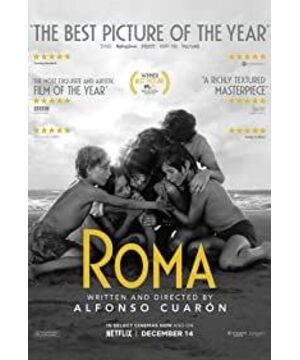I watched the movie "Roma" on Netflix on its first day. This small move may seem pointless in modern times, but you know it (I mean "Roma" on Netflix) has irritated François Aymé, president of the Federation of French Art Cinemas (AFCAE). In his open letter, he made several key points, including the privatization of art, and filmmakers adapting to new global broadcast platforms; and made comments in particular on "exclusive" collaborations like the Coen brothers, Alfonso Curran, and Netflix (which is a rebuttal).
In the entire open letter of François Aymé, although the issues of privatization of art and changes in the form of global broadcasting are mentioned, it is obvious that there is only one issue, and that is Netflix. What he criticized was the cooperation model between Netflix and Alfonso Curran, which forcibly decided and influenced the audience's right to choose; in fact, the real impact was the theater itself and the subsequent VOD licensing issue. What he might be more interested in asking is that Netflix spent $25 million to promote "Roma"; how much should those traditional, artistic screening theaters pay Netflix, a broadcasting platform that spends an average of $12 billion a year on programming content, to obtain the film "Roma" and its greatest effect from it. And today, the American Film Institute has also gilded "Roma". It is conceivable that Netflix's original investment was very cost-effective (successful).
François Aymé said: “As for Netflix, it’s not that you adapt to the audience, but the opposite: the audience has to adapt to the decision you made – to entrust your latest work exclusively and for a long time to a specific platform.” This problem is no longer ongoing; global OTT platforms like Netflix have already carved up the market for traditional broadcasts and theaters. On the bright side, as Alfonso Curran cried out, who would want to pay him a fortune to make a black and white Mexican film? If it weren't for the funding and publicity that Netflix poured into it, it's still unclear whether "Roma" would have achieved such success.
But François Aymé argues that choosing to sell the exclusive, long-term broadcast rights of an ambitious film to a paid platform is not a step forward, but a step backward. I feel the same way. For example, "Extinction", which was adapted from the novel "Lost in the South: Extinction" by Nebula Award winner Jeff VanderMeer and directed by Alex Garland, director of "Artificial Consciousness", was a pity that I didn't go to the theater. Although "Roma" still has a release schedule in Taiwan, I think the vast majority of viewers still choose to watch Netflix at home; in terms of plot, it is relatively easy!
Going back to the movie "Roma" itself, I don't think the original evaluation of this movie was so pessimistic after the second review; considering that the real reason for watching Netflix is commercial and financial considerations, "Roma" may not be good enough. But I want to know why the director Alfonso Curran is so insecure? As an autobiographical film, 90% of the pictures in the film are extracted from the director's memory, but the story is not about Fonso Courant; he may be in it, and in the turbulent 1970s in Mexico, who can stay out of it? After the second brush, I went back to think about "Best Foreign Language Film". Indeed, in terms of technology and qualifications, "Roma" can truly deserve its name. The only problem is that it is the latest work of the director of "Gravity"; this time he took a different approach and chose to tell a foreign language film.
"Roma" gave me a completely different viewing experience in the first and second brushes. The experience can also be caused by the topic; the film school and the Oscars. But just like many people will ask before watching a movie: "Why is a Mexican film called Roma?" In Spanish, ROMA is written in reverse, which means "love" (AMOR); this is a film about love. The symbolism of the film can be seen in the metaphor of the title. On the surface, "Roma" tells the story of a middle-class family and their nanny Cleo who lived in the Colonia Roma district of Mexico City in the 1970s; but the age is so big that the individual is only a microcosm. On a certain level, "Roma" is like a symbolic novel, which, through the perspective of small people, speculates on society, a country, or even a transition that it is not familiar with.
The background of the story of "Roma" is inherently class; Cleo is subservient to a white middle-class, and she comes from an Indian peasant society. In the film, scenes such as New Year's carnival and forest fires are constantly used to symbolically outline the throes that Mexico must go through in 1970 to welcome a capital of freedom. And that labor pain happened to fall on Cleo and his lover Fei Ming. Femin himself is the epitome of that era; he is a product of Mexico's '68. He is proletarian, anti-social, and easily controlled; and his contrasting attitudes toward Cleo illustrate the turmoil that Mexican society is facing. They are all tragic figures swallowed up by the times; Cleo broke the amniotic fluid, and his son failed to come to the world as he wished, symbolizing the student movement in Mexico at that time, and ultimately failing to write a glorious page for that period of history.
Alfonso Courant used a lot of metaphorical shots, from Cleo's point of view, to present an era that even he could not understand at the time. Death, crosses, scorched earth, revolution, and the tragedy of Sophia's family. People will say that "Rome" is a story about the absence of a man; Rome is a land without a man. At least in the director's memory, Cleo was the most vivid development of that era. Her life experience and circumstances are almost what her generation has to experience and encounter; then "love" is the most tragic invitation to maintain her and Sophia's family, and maintain her and this city without owners. But at least it's not hatred.
The shift of times, like Sophia's marriage, and her husband who left home. The quiet and flowing daily life at home is a rupture that is guarded by love and embraced by widowhood. Cleo's maternal love, under that bland scene, became no longer bland. And I also have to admit that "Roma" must be watched in theaters; otherwise, the aesthetics of Alfonso Courant's shots will only fill in the blanks and confirm the passage of time.
View more about Roma reviews











